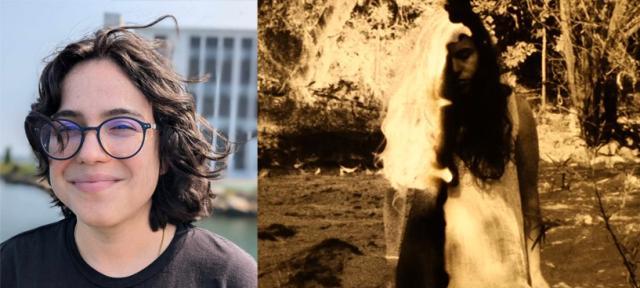Introducing Assistant Professor of Experimental Film and Media Michelle Trujillo

Hampshire College is pleased to welcome a number of exciting new professors to campus to support its fall class.
Before joining the faculty at Hampshire, Michelle Trujillo taught film production and contextual film courses at the University of Wisconsin-Milwaukee and film production courses at MassArt. During that time, she also taught part time at the Rhode Island School of Design.
“I’ve taught a variety of filmmaking classes at various levels,” Trujillo says, “but I usually enjoy teaching analog filmmaking the most. Teaching 16mm filmmaking brings me back to the wonder I felt when I was first learning it.”
Trujillo completed her undergraduate studies at Florida Atlantic University, in Boca Raton, with dual B.A. degrees in multimedia studies and Italian linguistics, as well as a certificate in women, gender, and sexuality studies. She completed an M.F.A. in film, video, animation, and new genres at the University of Wisconsin-Milwaukee along with a graduate certificate in women and gender studies.
She’s currently finishing work as a sound designer/editor for the Voices of Gun Violence Project in Milwaukee, which attempts to create a living archive of experiences with gun violence in order to promote community action, healing, and understanding.
What are you passionate about when it comes to this work?
In terms of areas of interest in my practice, I’m most interested in questioning and exploring representations of Latin American culture, gender, and identity creation. My work stems from an intersectional feminist perspective, but doesn’t always offer solutions to the problems I engage with. I’m interested in disorientation as a tool for upsetting power structures and notions of normality. I work in English, Spanish, and Spanglish as a mirroring of my lived experience.
I’m working on a feature documentary that takes the form of a farewell letter to my childhood home. Family bonds and ruptures spill out as I attempt to unravel the relationship between memory and space, moving forward and reminiscing on family migrations.
In a technical sense, I have a big interest in working with analog film. I’m very interested in hand-processing film, eco-processing, handmade special effects, and spending time working with film in my hands. In my spare time, I like to make cyanotypes and paper.
I’m passionate about creating media that contribute to a diverse representation of the Latin American experience. I’m interested in being a part of the sustainable future of analog filmmaking. I see this as a future that is less reliant on toxic chemicals and more connected to natural and organic materials, in turn making the medium more process-based. I want to help make these processes more accessible to students. I’m committed to connecting with students and facilitating a space in which they can create media that make them feel seen/heard/understood.
Where has your work appeared?
My films have been screened in festivals, galleries, and conferences both nationally and internationally, such as Alchemy Film Festival, Mimesis Documentary Festival, and the Wisconsin Film Festival. I’ve won multiple awards with my work, such as the Lightpress Grant and the LEF Moving Image Grant. I’m also an active member of the AgX Film Collective, in Boston.
What are you looking forward to at Hampshire?
I’m excited to work at an institution that has such an experimental approach to higher education. It seems like an approach that is constantly growing and improving. I’m excited about the opportunity to work more closely with students in smaller classes and with Hampshire’s Learning Collaboratives. I see the Environments and Change collaborative intersecting with my interest in sustainability within analog filmmaking.
Photo of still from Trujillo's film, Inundata.



